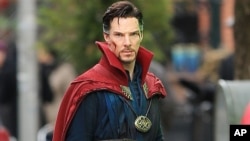A Tibetan male character from the "Doctor Strange'' comic books presented such a political minefield to Marvel that in the film version they cast a Caucasian woman in the role, reflecting the pressures Hollywood movie makers perceive when trying to appeal to the Chinese market.
One of the film's screenwriters has suggested that the casting of British actress Tilda Swinton as sorcerer the Ancient One was partly done to avoid potentially offending China's government and moviegoers, who now represent the world's second-largest annual box office after North America.
Although some online commentators criticized the casting of a white woman rather than a Tibetan actor, the film's backers apparently didn't want to risk losing out on Chinese distribution by introducing the highly politically charged subject of Tibet.
While the Ancient One was written in the comic book as Tibetan, "if you acknowledge that Tibet is a place and that he's Tibetan, you risk alienating 1 billion people,'' screenwriter C. Robert Cargill said in a podcast interview with the Texas-based DoubleToasted.com.
There was, Cargill said, a risk of "the Chinese government going, 'Hey, you know one of the biggest film-watching countries in the world? We're not going to show your movie because you decided to get political.'''
Hollywood producers are increasingly attempting to woo the Chinese audience and government with China-friendly story lines and Chinese actors. Only a limited number of Hollywood films are allowed into China each year and those dealing with political or social topics frowned upon by the ruling Communist Party are doomed to miss the cut.
Even given such concerns, the apparent degree of caution shown by Marvel was remarkable.
Movies that simply mention Tibet and Tibetans aren't necessarily displeasing to Beijing, although those that criticize its rule over the Himalayan region, such as the 1997 film "Seven Years in Tibet'' starring Brad Pitt, most definitely are. China says Tibet has been part of its territory for more than seven centuries, although many Tibetans say the region was effectively independent for most of that time.
In a statement, Marvel said it has "a very strong record of diversity in its casting of films,'' Mashable reported Tuesday. Marvel did not immediately respond to a request for comment from The Associated Press.
"The Ancient One is a title that is not exclusively held by any one character, but rather a moniker passed down through time, and in this particular film the embodiment is Celtic,'' the Marvel statement was quoted as saying.
Cargill, who wasn't involved in the casting of Swinton, said the comic book character of the Ancient One was "a racist stereotype.'' "There is no other character in Marvel history that is such a cultural landmine, that is absolutely unwinnable,'' he said, adding: "It all comes down on to which way you are willing to lose.''
Casting a "Chinese actress as a Tibetan character'' would have been a bad idea, Cargill said.
If a Tibetan actor had been cast in the role, Cargill said people would have criticized the movie as ``it's another white guy goes to the Orient, adopts their ways and then comes back and it's the great white hero story.''
He said director Scott Derrickson instead decided to "make one of the most powerful characters in the Marvel universe a woman.''
"Everybody kind of pats us on the back for that and then decides to scold us for her not being Tibetan,'' said Cargill. "We knew that the social justice warriors would be angry either way.''
"Doctor Strange,'' due out late this year in the United States and other countries, stars Benedict Cumberbatch as the titular neurosurgeon who goes on a quest to find the Ancient One and ends up being trained in otherworldly powers. Whether the film will be accepted for release in China isn't yet known.
Movie 'Doctor Strange' Turns Tibetan Man into European Woman

BEIJING —








